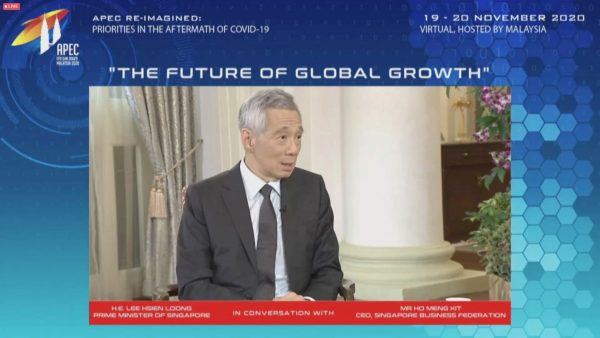With stringent border controls and compulsory testing of visitors to Singapore, concerns over a second wave of infections never materialised and companies were systematically allowed to resume operations in phases.
Between 18 February and 17 August 2020, the government announced fiscal commitments totalling S$100.9 billion (US$75.9 billion), with a projected budget deficit of S$74.2 billion (US$55.8 billion) for fiscal year 2020, in the annual budget and four supplementary budgets. Major measures include wage subsidies, tax and rental relief for companies to reduce job losses, monetary transfers and expansion of financial assistance programs to individuals and households to mitigate economic hardship from COVID-19, incentives for skills training and employment creation for citizens. The COVID–19 (Temporary Measures) Act 2020 was passed on 7 April 2020 to regulate socioeconomic activity and commercial liability for the duration of the pandemic.
The signs are encouraging for a strong economic recovery. Official reports estimate that the Singapore economy contracted by 5.8 per cent in 2020 and then reach positive growth of 4–6 per cent in 2021. The signing of the Regional Comprehensive Economic Partnership (RCEP) on 15 November 2020 and Singapore’s hosting of the World Economic Forum annual meeting in May 2021 provides added promise for expanded opportunities in trade and economic cooperation. Unilateral permission for air travel to Singapore will also aid economic recovery and cooperation.
Regulatory approval of COVID-19 vaccines in Singapore on 15 December 2020 further boosts optimism for a robust economic recovery in 2021. But Singapore’s economic recovery still remains ambiguous for a number of other reasons.
Early in the pandemic, Singapore became a model for the tracing and containment of COVID-19 transmissions. But a substantial increase in infections among migrant workers in dormitories re-emphasised the structural inequalities between these migrant workers and residents, particularly those in lower-skilled occupations. For residents, this was revealed in the use of means testing for assistance schemes when parliamentary members highlighted potential inconsistencies and vagaries in eligibility for individuals and companies.
The opaque implementation of fiscal measures adversely affects accountability and quality of governance, especially when aggregate unemployment has continued to increase disproportionately between labour groups and median incomes have also fallen. With the gradual reopening of the economy, previous unequal access to public assistance schemes suggests that various individuals and companies are operating at sub-optimal capacities.
The pandemic also highlights shortfalls in Singapore’s social safety nets. Policymakers continue to place primacy on employment in the formal sector as the key means for individual security. Social risk pooling remains limited as illustrated by the pricing of premiums for MediShield Life, the national basic health insurance scheme. It continues to be based on commercial principles where premiums increase disproportionately with age, exacerbating inequality.
There is argument that regular universal budget-financed transfers are necessary to facilitate greater social resilience in the face of a crisis as its absence otherwise potentially reduces appetite for the risk-taking necessary for a robust economic recovery. A persistent preference for means testing, even in a pandemic, for access to public financial assistance over a regular universal budget-financed social pension suggests that individuals bear more risk than is desirable for society.
The fiscal measures introduced in response to COVID-19 are potentially less effective at facilitating economic growth than the size of the budget deficit suggests. A major factor behind this is the prevailing reporting idiosyncrasies of the Singapore budget, including the inappropriate classification of revenues and expenditures. It understates revenue estimates and overstates expenditure meaning the stimulus effect of the budget will be more muted.
A general election was called on 10 July 2020 amid the pandemic. The ruling party retained its parliamentary majoritywith 83 of 93 seats and 61.2 per cent of the popular vote, compared to 2015 when it won 83 of 89 seats and 69.9 per cent of the popular vote. The result was surprising given that in previous elections, crises and budgetary handouts tended to increase electoral support for the ruling party. Post-election analyses raise a myriad of factors that influenced voters. Policymakers will need to address and integrate these concerns in Singapore’s post-COVID-19 growth strategies.
The protracted duration and impact of the COVID-19 pandemic places uncertainty on a robust economic recovery in 2021 for Singapore. This is unlikely to be mitigated by the use of parametric changes that adjust, but do not fundamentally alter, existing structural inequalities and risk-sharing. Policymakers need to have conviction to pursue more fundamental changes that will yield the conditions that are conducive and complementary to successful recovery in 2021. As a start, changing the pricing of MediShield Life premiums in line with social insurance principles would demonstrate policymakers’ commitment to substantial reform.
Chang Yee Kwan is a non-resident fellow at the Center for Southeast Asian Studies, National Chengchi University, Taipei.
This article is part of an EAF special feature series on 2020 in review and the year ahead.

